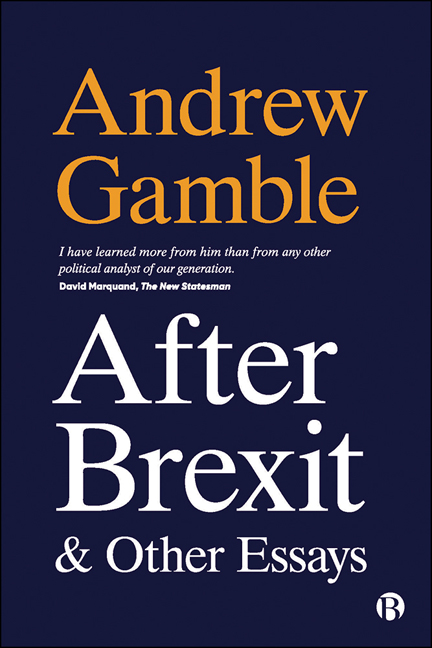Book contents
- Frontmatter
- Dedication
- Contents
- Preface
- Introduction: Historical Contexts
- Notes on the Essays
- 1 After Brexit (2019)
- 2 Explanations of British Decline (1999)
- 3 The European Disunion (2006)
- 4 The Anglo–American World View (2019)
- 5 The Free Economy and the Strong State (1979)
- 6 Thatcherism and Conservative Politics (1983)
- 7 Economic Growth and Political Dilemmas (1983)
- 8 The Crisis of Conservatism (1995)
- 9 The Thatcher Myth (2015)
- 10 Theories of British Politics (1990)
- 11 The Constitutional Revolution in the United Kingdom (2006)
- 12 What’s British about British Politics? (2016)
- Epilogue: Last Thoughts
- Notes
- Acknowledgements
- Index
8 - The Crisis of Conservatism (1995)
Published online by Cambridge University Press: 22 December 2021
- Frontmatter
- Dedication
- Contents
- Preface
- Introduction: Historical Contexts
- Notes on the Essays
- 1 After Brexit (2019)
- 2 Explanations of British Decline (1999)
- 3 The European Disunion (2006)
- 4 The Anglo–American World View (2019)
- 5 The Free Economy and the Strong State (1979)
- 6 Thatcherism and Conservative Politics (1983)
- 7 Economic Growth and Political Dilemmas (1983)
- 8 The Crisis of Conservatism (1995)
- 9 The Thatcher Myth (2015)
- 10 Theories of British Politics (1990)
- 11 The Constitutional Revolution in the United Kingdom (2006)
- 12 What’s British about British Politics? (2016)
- Epilogue: Last Thoughts
- Notes
- Acknowledgements
- Index
Summary
The Conservative party has always been one of the great certainties of British politics. It has been so dominant throughout the twentieth century that some observers have begun to speak of this period as the ‘Conservative Century’. Between 1945 and 1995, the Conservatives formed majority governments for thirty-two years and eight months – 65.6 per cent of the time. Centre-left governments have been uncommon, and have rarely lasted long. The Conservatives, by contrast, have often enjoyed long, uninterrupted spells in office. They won three consecutive general elections between 1951 and 1964, and four since 1979. Labour by contrast has never lasted in government for two full Parliaments.
At times, this remarkable ascendancy has suggested the kind of dominant single-party system which has been experienced in Japan, Sweden, or Italy. But the dominance which the Conservatives have enjoyed has not rested on any great record of national advance. Apart from the successes in two world wars, it has been associated with failure: economic decline and imperial retreat. The dominance of the Conservatives has rested on their command and understanding of the British state; this venerable institution has sometimes seemed on the verge of foundering, but it has survived into the last decade of the twentieth century with many of its more curious features still intact, the last major ancien régime and multinational imperial state left in Europe.
The identity of the Conservative party is inseparable from the history of this state. It has been the state's supremely flexible and adaptable instrument. In the last three years, however, the party has been plunged into the deepest crisis of support it has ever faced. There has even been speculation that it could suffer the fate of the Canadian Conservatives who were reduced to two seats in the 1993 general election. Given the lead which Labour has currently established in the polls, the capacity of the Conservative party to recover before the next election is widely doubted, and many commentators predict that the party could be out of office for more than a decade. Kenneth Clarke, the Chancellor, went still further, baldly stating that if the Conservatives were foolish enough to elect John Redwood as leader in place of John Major it would be out of office for a thousand years.
- Type
- Chapter
- Information
- After Brexit and Other Essays , pp. 151 - 176Publisher: Bristol University PressPrint publication year: 2021



